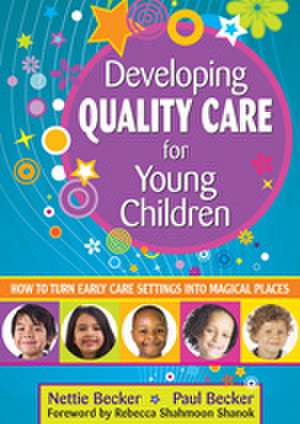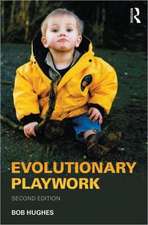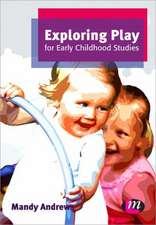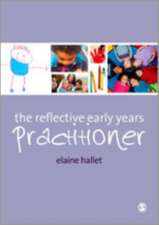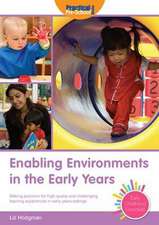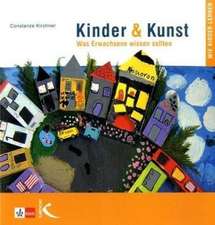Developing Quality Care for Young Children: How to Turn Early Care Settings Into Magical Places
Autor Nettie Becker, Paul Beckeren Limba Engleză Paperback – 17 noi 2008
Preț: 242.78 lei
Nou
46.46€ • 48.60$ • 38.59£
Carte tipărită la comandă
Livrare economică 03-17 aprilie
Specificații
ISBN-10: 1412965667
Pagini: 200
Dimensiuni: 178 x 254 x 15 mm
Greutate: 0.41 kg
Ediția:1
Editura: SAGE Publications
Colecția Corwin
Locul publicării:Thousand Oaks, United States
Recenzii
“The book is well connected to literature, the author’s own research and perspective, and an eye toward the future with tools for creating places for child care that are good for kids. If only we could bottle up Rosa Lee Young and give it to all children.”
"I cannot think of anything pertaining to high-quality child care programs that isn't covered in this book. The organization is clear, consistent, and easy to follow."
"The book’s power is in its details which utilize nuance from the ‘small places,’ here a child care center. With detail of everyday moments in everyday lives, they breathe life into principles gathered from the study of many fields over decades. The Beckers provide the light of substance for child care workers, directors, teachers, graduate and undergraduate educators, policy makers, and children alike."
Cuprins
About the Authors
Authors' Note
Acknowledgments
Prologue to a Dream that Came to Be
Introduction
The Critical Need for Quality Early Child Care
1. The Little House on Village Avenue: What Makes a Good Child Care Center
Quality Care Is Not Just Day Care: How a Good Early Child Care Program Prepares Children for Life
The Toddler Classroom: Where a Skilled Child Care Professional Can Open Up the World to Children
Translating Principles Into Practice in a Good Child Care Program
High-Quality Child Care: Some Other Basics
2. The First Task of Early Child Care: Building a Trusting Relationship Between Caregiver, Child, and Family
Attachment, the First Basic Need of All Children
Creating a Stimulating and Nurturing Atmosphere in the Classroom
How Can a Teacher Handle Aggression in Children?
Flexibility and the Adult-Child Relationship: Why Rules and Schedules Need to Be Adapted
Building Human Relationships in Every Classroom
The Underlying Class Theme: We Are All People and I Am Somebody
Making Parents Welcome: An Essential Component of the Relationship Between Caregiver and Child
How Does Your Child Care Center Build Relationships Between Caregiver, Child, and Family?
3. The Second Task: Developing Wholesome Peer Relationships Among Children
Why Building Peer Relationships Is a Necessity Among Children
The Stages of Play
Teaching Children to Resolve Conflicts: An Essential Task of Early Childhood Educators
4. The Role of Curriculum and Staff Development in Early Child Care
The Importance of a Well-Planned, Appropriate Curriculum
Building the Important S-A-Ts in Children: Separation, Autonomy, Trust
Learning by Hands-On Experience
Staff Development Is an Ongoing Process
5. The School as a Reflection of Our Diverse Heritage
Diversity as a Natural Part of the Curriculum
Handling Ethnic Stereotypes Among Children
Cultural Diversity and Differing Expectations
Working With Children of Different Cultural Backgrounds: Some Helpful Hints
How Does Your Child Care Program Take Advantage of America?s Richly Diverse Cultural Heritage?
6. High-Quality Child Care as a Learning Experience
Learning as a Natural Process
Play Is the Work of the Child
The Learning Centers
The Daily Schedule
All the Things They Were Learning
Epilogue
Appendix A: Rosa Lee Young Curriculum Outline
Prekindergarten and Kindergarten
Activities and Learning Experiences Throughout the Day
Toddler Activities and Learning Experiences Throughout the Day
Appendix B: Developmentally Appropriate Practice in Early Childhood Programs Serving Children From Birth Through Age 8 (National Association for the Education of Young Children)
Appendix C: Reggio Emilia
Reggio Emilia and the Hundred Languages of Children
The Nine Baisc Principles of Reggio Emilia
Notes
Index
Notă biografică
Nettie Becker has devoted her entire professional life to working with young people, first as a teacher and counselor of high school students, and for the past 20 years in the field of infant and early child care. She has designed, set up, and implemented a movement program of adaptive physical education at a school for special children and has worked as a child development consultant for day care programs in New York City. She has also taught parenting classes in the continuing education department at Molloy College in New York.
She currently conducts workshops in child development and movement through play for parents and their children in community library programs in Nassau County, New York. She has also introduced a community program for the parents of infants to help them engage with their babies through motor, sensory, and emotional stimulation in their first year of life.
Becker is a fellow emeritus in early childhood group therapy at the Child Development Center of the Jewish Board of Family and Children¿s Services and was part of the program¿s continuing education committee that served as a consulting group for child care professionals.
She is the coauthor of A Comprehensive Guide for Caregivers in Day Care Settings (1999). Becker holds a master¿s degree in professional studies, majoring in dance/movement therapy that combined movement and psychology in the development of young children. She is a full member of the Academy of Dance Therapists Registered and has also been trained in the Kestenberg movement profile analysis that evaluates movement patterns and personality.
